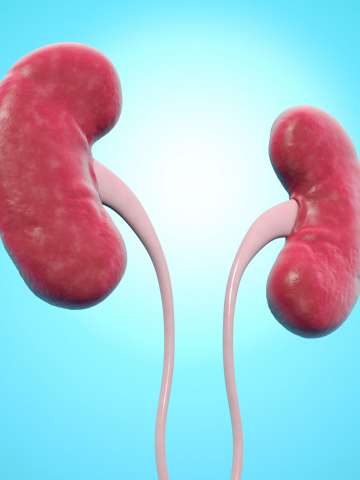Kidney Stones & Urinary Obstruction
Our urologists comprehensively care for patients with kidney stones, urinary obstruction, and enlarged prostate. We use minimally invasive techniques as often as possible, leading to less pain and quicker recoveries.


Why choose UCLA Health for urological care?
Our urologists offer state-of-the-art medical and surgical care for kidney stones, urinary obstruction, and enlarged prostate. We use minimally invasive approaches as often as possible to decrease discomfort and maximize outcomes.
Highlights of our program include:
History of innovation: We were the first institution on the West Coast to use noninvasive shockwave lithotripsy to treat kidney stones in 1985. Our physicians remain regional leaders in state-of-the-art kidney stone treatments.
Patient-centered care: We use a preventive care approach, emphasizing patient education to prevent health conditions from recurring. Our specialists offer comprehensive, personalized treatment for sensitive health concerns.
Treatment from a team of experts: Our specialists’ depth of experience means you receive care from established experts. For example, our team has the most extensive experience in Southern California for managing complex urinary obstructions.
State-of-the-art techniques: We specialize in advanced endoscopic techniques such as holmium laser enucleation of the prostate (HoLEP) and robotic-assisted laparoscopic simple prostatectomy. We also perform minimally invasive procedures such as UroLift and Rezum.
Urological conditions we treat
Our urologists treat a broad range of urologic conditions, including:
Benign prostatic hyperplasia (BPH): An enlarged prostate gland, typically occurring as men age
Kidney stones: Small, hard mineral deposits that form in the kidneys and are often painful to pass
Ureteropelvic junction (UPJ) obstruction: A blockage in the area where the ureters attach to the kidneys
Ureteral strictures: Narrowing in the tubes that carry urine from the kidneys to the bladder (ureters)
Treatments we offer
We offer a full range of advanced therapies for kidney stones and urinary obstructions. Kidney stone treatment may include:
Shockwave lithotripsy: This treatment uses ultrasonic waves to break up kidney stones, making them easier to pass.
Ureteroscopy: The doctor places a small scope through the urethra (tube that empties urine from the body) to reach the bladder and ureters. They may use this method may be used to remove a kidney stone by breaking it up with a laser or removing it with a basket device.
Cystolitholapaxy: The doctor places a scope through the urethra into the bladder. Ultrasound waves or laser energy are used to break up a kidney stone that has moved into the bladder and to remove the fragments.
Percutaneous nephrolithotomy (PCNL): The surgeon makes a small incision in the back to access the kidney. A scope and special instrument are then inserted to locate, break up and remove kidney stones.
Treatment for UPJ obstructions or ureteral strictures may include:
Endoscopic balloon dilation: Surgeons may treat ureteral strictures by placing a small device that looks like a deflated balloon in the ureter. When the balloon expands, it helps open the ureter to restore proper urine flow.
Laser endopyelotomy: Surgeons insert small instruments into the urinary tract or kidney. They use laser energy to remove the tissue that’s causing a UPJ obstruction.
Robot-assisted laparoscopic pyeloplasty: Surgeons perform this operation to remove a UPJ obstruction. They place a small tube called a stent in the ureter to help the kidney drain properly.
We also offer multiple options to treat BPH, including:
Rezūm: This short, outpatient procedure uses water vapor therapy to shrink the prostate. Your urologist sends sterile water vapor to the prostate tissue in nine-second intervals. Over time, your body absorbs the tissue and the prostate shrinks.
UroLift: Surgeons place small implants that lift extra prostate tissue away from the urethra. This procedure doesn’t involve any surgical incisions or removal of prostate tissue. Instead, it compresses and moves excess prostate tissue out of the way to restore urine flow.
Holmium laser enucleation of the prostate (HoLEP): Surgeons use a holmium laser to remove excess tissue around the prostate.
Robot-assisted laparoscopic simple prostatectomy: Surgeons remove the inside portion of the enlarged prostate. This helps restore urine flow without removing the entire prostate.
Meet our team
Our urologists are experts in treating kidney stones, urinary obstruction, and benign prostatic hyperplasia (BPH). We continually research and learn new techniques so that patients always receive leading-edge care. Our urologists use minimally invasive approaches to promote quicker recovery with less pain.
UCLA Faculty and Providers


Contact us
Call 310-794-7700 to request an appointment with a kidney stone specialist at UCLA Health.






